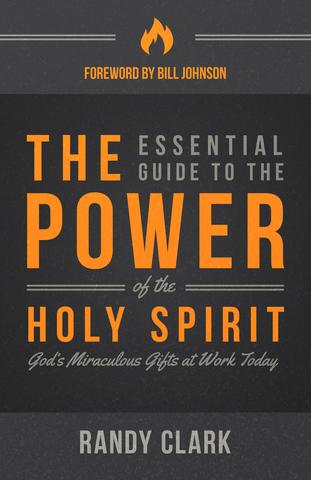Randy Clark: The Essential Guide to the Power of the Holy Spirit
 Randy Clark, The Essential Guide to the Power of the Holy Spirit: God’s Miraculous Gifts at Work Today (Shippensburg, PA: Destiny Image, 2015), 221 pages.
Randy Clark, The Essential Guide to the Power of the Holy Spirit: God’s Miraculous Gifts at Work Today (Shippensburg, PA: Destiny Image, 2015), 221 pages.
Randy Clark is the president and founder of the Global Awakening ministry school and adjunct professor at United Theological Seminary and Regent University Divinity School. He has traveled and ministered in multiple venues and countries, and he is a noteworthy Spirit-filled conference speaker and minister, with many documentable divine healing experiences. This Essential Guide is an apologetical work that seeks to defend the continuationist position of spiritual gifts and miraculous healing in order to equip the reader with information to support the argument against cessationist controversies. It is written with the popular reader in mind, rather than for an academic reader and therefore it has minimal endnotes and it uses concepts, words, and terms that are within the reach of the non-academic person.
Clark draws the lines of thinking and summarizes the arguments between the continuationist and cessationist authors, identifying some of the popular historical and contemporary positions. He acknowledges that his book is not meant to be a complete guide; rather, it is only pointing to the primary or essential points of each position. Clark divides this book into four major parts: first, he defines the historical and ongoing division in Christianity on the work of the Holy Spirit; second, he focuses on the genuine work of the Holy Spirit today; third, he elaborates on Jonathan Edwards’ five classical keys for evaluating an authentic work of the Holy Spirit; and fourth, he guides the reader on how to personally experience the ongoing work of the Holy Spirit. At the conclusion, appendices are included, which provide statistical and evidence to support the ideas presented in the book.
This book can serve as a general introduction to the historical and contemporary arguments between cessationist and continuationist positions. It does not fully resolve any of the arguments, but it does point the reader to resources that will provide a greater depth of information. Unfortunately, there are a couple statements that may prove to provide additional support for those who look for errors in the theological and exegetical positions of the adherents of the continuationist perspective.
On page 157, Clark stated, “biblical principles should never become a substitute for the privilege of knowing and being led by the Holy Spirit’s presence.” As a stand-alone statement this can (and unfortunately, probably will) be lifted out of the context of its chapter. Out of context, it places the subjective “Spirit-led” aspect over the objective “biblical principle” that stands counter to the Reformation mandate, sola scriptura. However, in context, Clark will describe the blessing of having scripture enlightened by the Holy Spirit, which enriches any Holy Spirit filled Christian’s understanding.
Another unfortunate error is found on page 129, where Clark stated, “The Greek word translated teaching (see Matt. 28:20) in the NIV is rhema or word.” The Greek word is actually didaskontes, which is indeed properly translated as teaching in many translations. If we give Clark the benefit of the doubt here, we may find that he is referencing another text, but that this error was somehow overlooked. As written above, this will likely also become fuel for the polemic opponents of the continuationist.
Writing as a reviewer who holds the Pentecostal and Charismatic experiences as dear, we cannot give Clark’s book a wholehearted recommendation, even though we find agreement with the major premise of it. It is a book that may give understanding to the above theological debate, but it will need to be read with critical thinking, being aware of its strengths and weaknesses. Our desire is that it undergoes another round of editorial critique and be republished as a second edition, with the errors removed from it.
Reviewed by John Miller
Preview: https://books.google.com/books?id=xDfRBQAAQBAJ
Publisher’s page: http://www.destinyimage.com/products/the-essential-guide-to-the-power-of-the-holy-spirit


